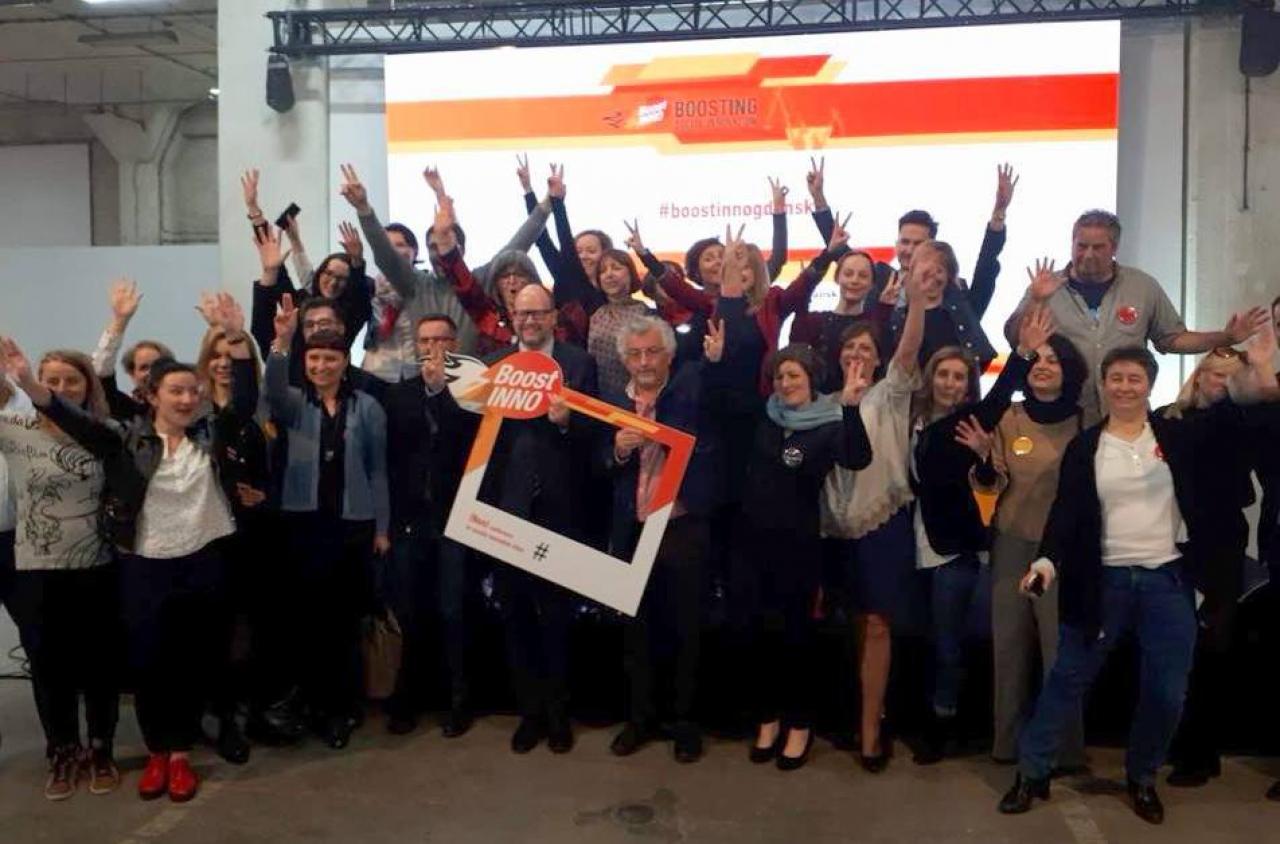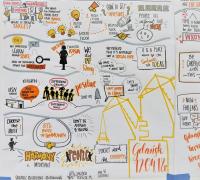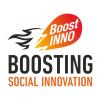
[[{"fid":"20624","view_mode":"default","fields":{"format":"default","field_file_image_alt_text[und][0][value]":false,"field_file_image_title_text[und][0][value]":false,"field_author[und][0][value]":""},"type":"media","field_deltas":{"4":{"format":"default","field_file_image_alt_text[und][0][value]":false,"field_file_image_title_text[und][0][value]":false,"field_author[und][0][value]":""}},"link_text":null,"attributes":{"height":464,"width":1654,"class":"media-element file-default","data-delta":"4"}}]]
Boosting Social Innovation - an URBACT project has been summarized in Gdansk.
In Paris - the Olympic Citizens' Budget, in Milan - the fourth industrial revolution, in Wroclaw - the shaping of commercial streets in the city together with residents.
The goal of all these initiatives is the same: to stimulate social innovation. 10 cities in Europe are summarized by the BoostINNO project, whose Gdansk is the leader.
The BoostINNO project is about to end, in which, for 2.5 years, representatives of ten European cities worked on developing the subject of social innovation. Social innovation is a philosophy of changing the way a city is managed, in which the role of power is no longer planning and managing the implementation of plans but co-designing the future and introducing innovative changes with the participation of residents.
It is them who, as people who know their nearest surroundings, have to change the city for the better - from the inside. The city's authorities and administration are to help them, encourage them and support them. In short, the local government is to be a broker of social innovation. The event summarizing the project is not accidental in Gdansk (on April 11 - 13), because it is the city, and precisely the Department of Social Development of the Gdansk municipality is the leader of BoostINNO.
Innovative Gdansk
Before the participants of the project from Paris, Strasbourg, Turin, Milan, Barcelona, Braga, Baia Mare, Wrocław and the Skania province presented plans to support the development of social innovations, they visited several places in Gdansk with innovative" energy.
At the Orunia they met with representatives of the Gdansk Foundation for Social Innovation, which for years has been initiating social changes in this district. It runs here, among others neighbor's house and cafe, and together with the inhabitants, transforms the yards. They were also in Garrison, which is a flagship example of creating a new urban fabric. In the Lower Town they heard about the plans for district revitalization and visited the Neighborhood Energy Incubator.
- There would be no transformation of all those places you visited today if it were not for the participation of residents and social organizations - said Piotr Kowalczuk, Gdańsk's Deputy Mayor for social issues, welcoming guests. - I hope that everything you've worked out together is just the beginning. Thanks to you in the scale of the whole of Europe, we have seen what the challenges in social innovation look like. Recently, in Paris, the presidents of all the cities of BoostINNO signed a declaration of will to further cooperation in this area and this is crucial for us.
- There is no economic development without social and vice versa - emphasized Aleksandra Dulkiewicz, Deputy Mayor of Gdansk for economic policy. - We are trying to implement management in Gdansk with the participation of residents. There is no other way, if we want to implement our strategic goal, to make Gdansk an attractive city for life and development for everyone. Regardless of whether someone was born here, he came from Warsaw, Kiev or Madrid.
Are we allowed to experiment?

Piotr Wolkowinski, the lead expert of the Boost INNO project, said at the outset: - The world does not look like it was more than a dozen years ago. Co-designing the future with the participation of residents is not easy, but it must become the norm of the cities' activities. One must learn to find a balance between planning and participation of the inhabitants and create a favorable environment for this cooperation.
An important part of almost three years of work within the project was experimenting, trying ideas that did not necessarily bring the intended results.
- Are we allowed to experiment - Piotr Wolkowinski asked. - Yes, in many cities today, we feel that changing approaches and taking risks is needed to keep up with the dynamic changes in society. We have to learn on small, pilot projects and value learning from possible failures. In Silicon Valley, only a company that has suffered a failure can count on serious investor support.
Kristian Radojčić from URBACT Secretariat also participated in the summary.
- I think that all participants of the BoostINNO project have changed their mentality in the area of city management, understanding how important and the role of social innovation in cities will be - said Kristian Radojčić. – Your cities are laboratories of new experiences in this area. We will publicize them and involve you further in future URBACT projects.. We also want to influence the decision-makers of the European Union so that the policy pursued at the European level can keep up with the pioneering changes happening in individual cities.
It will be a revolution
How did the representatives of individual cities "open" about the subject of social innovation? We'll give some examples.
Wroclaw will focus on the beginning of the city center. A help desk is planned - a place of support and contact for entrepreneurs running shops on commercial streets and an info point where, together with residents and business representatives, a policy of planning the development of central Wroclaw streets will be shaped.
Portuguese Braga has ambitions to become a city in "100% friendly to young people ". - There is probably no city in Europe that would not consider itself friendly to the young. After all, we have universities, cultural offer and spaces for recreation, that is everything young people need - said Carlos Santos from Braga, who stressed that cities are investing widely in youth organizations through grants and there are also such cities that make use of EU funds to provide targeted services for young people, eg supporting graduates when entering the labor market.
- But it is still not enough and there is no option for the young people to be able to sit down with the mayor and talk about their needs, although usually they would not want to make such a conversation - said the Portuguese. - The role of city authorities is to stimulate such activity and only these three elements build the city in 100% for young people. Our goal is to define such a model of cooperation that will enable the generation of energy for young residents in the direction of solving their real problems and jointly shaping the development of the city.
Patrick Tranoy from Paris once again stressed why social innovation is the only development option for cities: - Even 25 years ago, we did not deal with it, because democracy was obvious. Today, maintaining democracy, in the era of xenophobia and populism, is a challenge. We can not be so sure that we will have it forever. All the more so we must put our attitudes and commitment into the civic center.
Partick Tranoy talked about the important role of the civic budget in Paris (EUR 100 million per year, or 5% of the investment budget of the French capital). No resident is excluded from voting, the budget is also decided by foreigners without the right to vote in elections and children.
- And they usually choose solidarity and circular economy projects - he added.
A special edition of the participatory budget is planned before the Olympic Games in Paris (2024) so that the Olympics will also be an event for the residents.
Milan's representative, Clara Caligaris, announced the creation of the "Milan Manufacture", a space where the craft and design traditions of the city will merge with each other as part of the fourth industrial revolution.
- Each of the earlier revolutions began with specific innovations that had an impact on social development: steam, electricity, electronics - said Clara Caligaris. - Now it is
a revolution of combining innovations that are already around us: 3D printers, robotics, the internet of things ... You have to be prepared for a huge change in the economy, for many people also for professionals.
The response to the challenge is to be personalized craft combined with the design and technology and strength of startups, of which modern Milan is also famous.
- As the local government, we want to give people the tools to connect all these threads and find out how we can help them - she explained. - We have sent out a call for
a revolution. The representatives of startups, industry, universities and craftsmen responded to them. We were worried about the interest, but the idea worked. 350 people came, 120 people spoke.
We have already written about how Gdansk will implement the philosophy of social innovation. It is worth adding that, as befits an "innovative approach", the Gdansk event was entitled (NON) conference of socially innovative cities, and Wednesday's project presentations were held in the former Alternativa gallery over the B90 Club in the yard. Representatives of the largest Polish cities were also invited to participate in the event.
On Thursday (April 12), the project partners together with local social activists got to know and design a new place on the map of Gdansk, which will soon become the cradle of Gdansk social innovations, and it will be the building at ul. Dolna Brama 8 in the Lower Town.
Plenary session of BoostINNO final event was live on Youtube BoostINNO Channel http: //bit.ly/boostinnolive

